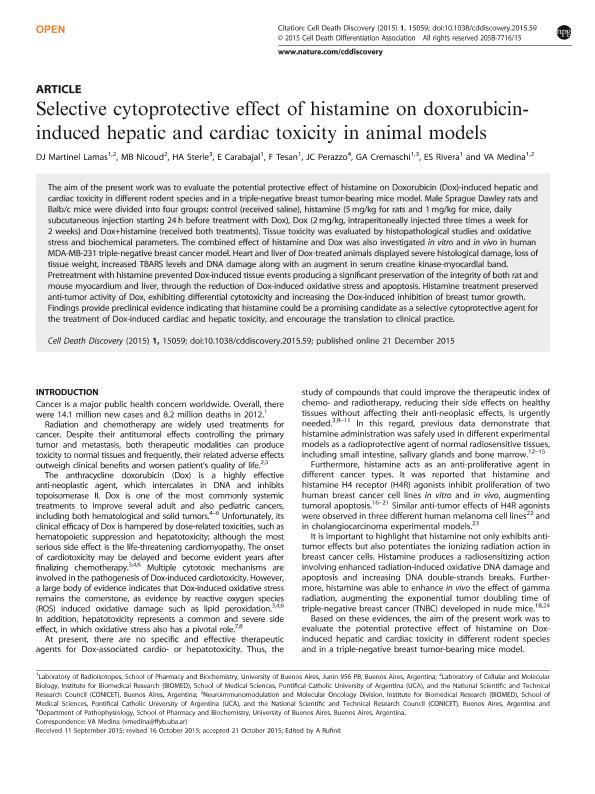Artículo
Selective cytoprotective effect of histamine on doxorubicin-induced hepatic and cardiac toxicity in animal models
Martinel Lamas, Diego José ; Nicoud, Melisa Beatriz
; Nicoud, Melisa Beatriz ; Sterle, Helena Andrea
; Sterle, Helena Andrea ; Carabajal, Eliana
; Carabajal, Eliana ; Tesan, Fiorella Carla; Perazzo, Juan C.; Cremaschi, Graciela Alicia
; Tesan, Fiorella Carla; Perazzo, Juan C.; Cremaschi, Graciela Alicia ; Rivera, Elena Susana; Medina, Vanina Araceli
; Rivera, Elena Susana; Medina, Vanina Araceli
 ; Nicoud, Melisa Beatriz
; Nicoud, Melisa Beatriz ; Sterle, Helena Andrea
; Sterle, Helena Andrea ; Carabajal, Eliana
; Carabajal, Eliana ; Tesan, Fiorella Carla; Perazzo, Juan C.; Cremaschi, Graciela Alicia
; Tesan, Fiorella Carla; Perazzo, Juan C.; Cremaschi, Graciela Alicia ; Rivera, Elena Susana; Medina, Vanina Araceli
; Rivera, Elena Susana; Medina, Vanina Araceli
Fecha de publicación:
12/2015
Editorial:
Cell Death Differentiation Association
Revista:
Cell Death Discovery
ISSN:
2058-7716
Idioma:
Inglés
Tipo de recurso:
Artículo publicado
Clasificación temática:
Resumen
The aim of the present work was to evaluate the potential protective effect of histamine on Doxorubicin (Dox)-induced hepatic and cardiac toxicity in different rodent species and in a triple-negative breast tumor-bearing mice model. Male Sprague Dawley rats and Balb/c mice were divided into four groups: control (received saline), histamine (5 mg/kg for rats and 1 mg/kg for mice, daily subcutaneous injection starting 24 h before treatment with Dox), Dox (2 mg/kg, intraperitoneally injected three times a week for 2 weeks) and Dox+histamine (received both treatments). Tissue toxicity was evaluated by histopathological studies and oxidative stress and biochemical parameters. The combined effect of histamine and Dox was also investigated in vitro and in vivo in human MDA-MB-231 triple-negative breast cancer model. Heart and liver of Dox-treated animals displayed severe histological damage, loss of tissue weight, increased TBARS levels and DNA damage along with an augment in serum creatine kinase-myocardial band. Pretreatment with histamine prevented Dox-induced tissue events producing a significant preservation of the integrity of both rat and mouse myocardium and liver, through the reduction of Dox-induced oxidative stress and apoptosis. Histamine treatment preserved anti-tumor activity of Dox, exhibiting differential cytotoxicity and increasing the Dox-induced inhibition of breast tumor growth. Findings provide preclinical evidence indicating that histamine could be a promising candidate as a selective cytoprotective agent for the treatment of Dox-induced cardiac and hepatic toxicity, and encourage the translation to clinical practice.
Palabras clave:
Breast Cancer
,
Chemotherapy
,
Mechanisms of Disease
Archivos asociados
Licencia
Identificadores
Colecciones
Articulos(CCT-CENPAT)
Articulos de CTRO.CIENTIFICO TECNOL.CONICET - CENPAT
Articulos de CTRO.CIENTIFICO TECNOL.CONICET - CENPAT
Citación
Martinel Lamas, Diego José; Nicoud, Melisa Beatriz; Sterle, Helena Andrea; Carabajal, Eliana; Tesan, Fiorella Carla; et al.; Selective cytoprotective effect of histamine on doxorubicin-induced hepatic and cardiac toxicity in animal models; Cell Death Differentiation Association; Cell Death Discovery; 1; 12-2015; 1-11
Compartir
Altmétricas



